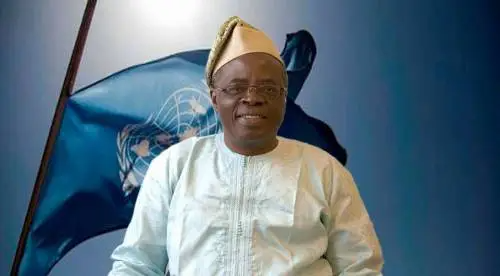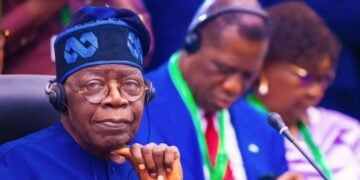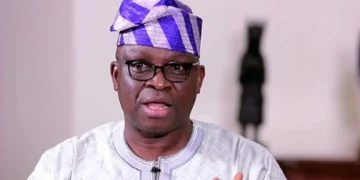You were a one-time head of Political Affairs at the United Nations – African Union – Mission In Darfur (UNAUMID). What are some of the challenges militating against the growth of African nations?
I have had various leadership responsibilities with the United Nations because I joined at the officer’s level, proceeded to the managerial level before attaining the leadership level. All those involved lots of training that the United Nations gives and quite some efforts as academics. Before I joined the UN, I analysed a lot and came to the conclusion that the problem we faced in Africa is leadership deficits. We do not have people you can refer to as leaders. If anything, they’re actually mis-leaders. And that problem Africa faces is very, very pungent in Nigeria. Aside from the very first set of leaders that we had before the military incursion into the Nigerian polity, not all of them, but some of them definitely stood out and in particular, I am very passionate about late Chief Obafemi Awolowo. Not because he was a Yoruba man, but because all what he achieved for the Western Region of that time during the self-government was very evident for the world to see. But for people like the late Obafemi Awolowo, my generation, myself in particular, would not have had the education that allowed me to break out of poverty that was on the ground. You can say very easily that the leadership deficit accounts for the corruption, but I’d like to single out corruption because if you have leaders that are serious, they will ensure that corruption disappears.
Could that have explained why you are advocating for a confederal system of government?
A confederal system of government is essential and necessary for us to get out of the morals that we are facing in Nigeria. Our union is definitely a faulty one because it is based on a militaristically centralised federalism. It didn’t start that way and I’m talking about the period before independence in which we had more or less, a confederal arrangement. People called it whatever they liked, but what was taking place was a confederation. You had the British, who were no longer bringing money into the system and everybody had to generate from within their own territories and on the basis of what they had generated, they were able to maintain their affairs. So, it was possible for Awolowo to tax cocoa farmers and use the proceeds to provide a popular, compulsory and free education for every child born, not only the Yoruba children, but every child born in the Western Region. And when you look at the attempt that was made after that, when we had independence and negotiated the Constitution for 1963, the regions also had their own Constitutions and it was clearer that there were more things beyond the period of independence, that went into the centre on behalf of all, but it was still very weak. Then came the 1966 military coup and the same Nwabueze, who is still alive, drafted the unitary system decree for late Gen. Aguiyi Ironsi. That decree was the beginning of militaristic centralisation. Of course, at the end of the civil war, we continued. Nobody doubted anymore because everything went on the military arrangements; centralised up to the fact that when we have the 1999 Constitution and you will see all that was arrogated to the states to even the exclusive of the central level. But look at the federal entities around the world, that is not the case.
But how do we achieve a confederal system against the backdrop that there is an existing Constitution of the Federal Republic of Nigeria?
Well, we have to come into the conclusion that the 1999 Constitution is not working for us. It is not going to allow us to move forward and it is not a matter of everyday tinkering with it. Several things were put forward against it, even former President Buhari wanted to say that all the waterways belonged to the federal government. We need to accept that the Constitution is faulty and it’s not possible to make progress under that Constitution. We have been analysing its orientation towards a militaristically centralised federalism: that has to go.
At the economic level, there are so many things we need to reorientate. Away from people being able to steal as much as they like whenever they want to take money from the federal purse for personal reasons and even if they are investing such money, but no, they are not. They only put them in Pandora Papers; Panama Papers; Paradise Papers. All those PPPs, but what has happened? In some countries, they punished the people who stole their monies; but who has even been punished here in Nigeria? We don’t because for us, it’s all normal! But if we can get a critical mass that comes to the conclusion that this Constitution is not working, then we will have a Sovereign National Conference (SNC). Now, I must separate an SNC from a National Conference (NC)….
We had one during the regime of former President Goodluck Jonathan!
You had a CONFAB during the era of former President Jonathan, but what happened to the report? Jonathan was to look at it, issue a White Paper, but he didn’t do anything about it because it wasn’t in his interest to win elections and so, he didn’t implement it. Former President Buhari came in and he jettisoned the report. That wasn’t a Conference. A Sovereign National Conference (SNC) means that the Conference you are undertaking is the sovereign! You don’t have to go to any parliament or executive before making any decision. If at such an SNC you come to the conclusion that ‘the president goes today and those of us gathered here today, we are putting XYZ in charge of our country in the interim’, that is the way it is. Whatever you so decided is not subjected to any other authorisation because it is sovereign.
But who will now convene such a Sovereign National Conference and where will such derive his power from?
That was why I said if we have a critical mass that comes into the conclusion that things are now working with the present Constitution. The nationalities because people deceive themselves that political parties are the solutions to our problems. As I clearly pointed out in my Inaugural Lecture of July 5, the political parties are just one way of arrogating and articulating interests. There are several other possibilities that you could have the nationalities that we are all meeting and taking a decision that goes in our interests. But no power gives up so easily and that is the point that I was making that if you are expecting President Tinubu to call on you that call on you and say that “now, we need to have restructuring,” it won’t happen because very few times in history have you have people come in and commit what we call class suicide.
Will it be correct to tag the last #EndSARS crisis as an example of the critical mass movement you’re talking about?
The #EndSARS was not a revolution, it was just a protest of the youths on the basis of the experience they were having with the police. That protest became something formidable because it held the jugular of Lagos. I emphasised Lagos because #EndSARS protest did not happen beyond a few cities. The organisation was limited and focused on Ikeja and Lekki Toll Gate axis of Lagos State and they were able to paralyse traffic in a number of places. Then we had skirmishes in other places like Abeokuta in Ogun State and Benin City in Edo State. At the end of the day, it wasn’t a national movement. In actual fact, many in Abuja, the Federal Capital Territory (FCT) and some other parts of the North were saying that it was the Lagosian and Yoruba people trying to truncate their own time at the presidency when “their son” is in charge. So, that was far from the revolutionary situation. I don’t under-estimate the importance of those young people who organised themselves for change, no! They did a lot in trying to create a critical mass, but they were far from it and it ended up becoming an ethnic protest at the end of the day because of those who infiltrated the protest because we no longer knew when an organised effort took over and decided to burn assets of the Lagos State Government.
President Bola Ahmed Tinubu belongs to the class of those Afenifere whose cardinal objective revolves around restructuring. What would be your word of advice to him as he appoints his ministers?
I think the ministerial list is ready because we are going to have the list of people that made it easier for him to win election as ministers. That is the objective reality I was talking about! He cannot go outside of that except for a few technocrats he was talking about. He cannot ignore former Governor of Rivers State, Nyesom Wike, even if himself is not going to be a minister, Tinubu will have to take people from his camp. This is why I said even if President Tinubu wanted to fight corruption, the objective reality is that the institutions around him will militate against his desires. There is a popular saying, “Show me your friends and I will tell you the kind of a person you are!” So, people should not expect any miracle in the list of the ministerial candidate to be appointed by President Tinubu. Look at the calibre of the people now visiting the Villa. I clearly pointed out that President Tinubu will no doubt, improve on our Gross Domestic Product (GDP), he will definitely push the limits higher; but what happens after the improvements?
There is even the clamour that President Tinubu should probe ministers that served under former President Buhari?
Tinubu can only cherry-pick; the problem is humongous! Corruption has eaten deep into the fabric of our societal existence. He will do far better than former President Buhari in other aspects of our socioeconomic life, but definitely not on the anti-corruption fight.





